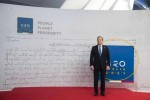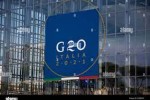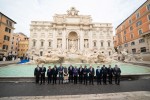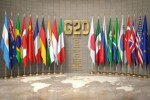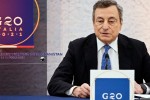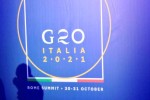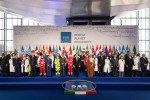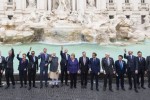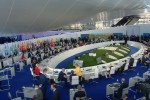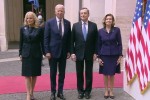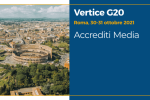MAIN EVENTS
|
30 October 2021
Iniziative (EN) -
Maison de la Paix (EN)
 "A great opportunity hampered by bureaucracy and by the specific interests of large countries such as China and Russia: we need to create the UNITED STATES OF THE WORLD".
"A great opportunity hampered by bureaucracy and by the specific interests of large countries such as China and Russia: we need to create the UNITED STATES OF THE WORLD".
This is how the president of the Fondazione Mediterraneo Michele Capasso expressed himself in Rome at the conclusion of the G20 work.
A large oval table, framed by the flags of the leading countries with the addition of that of the European Union. All around, the backdrops with images of Italian landscapes and the slogan of the summit 'People, planet, prosperity'. Mario Draghi welcomed the world leaders in the room set up inside the Cloud where the work of the Summit of the Great Ones takes place.
"Dear colleagues, it is a great pleasure to welcome you here in Rome for this G20 and to see you here after the difficulties of recent years", began the premier opening the first session. Draghi was the first to take his place, after the 'photo opportunity', at the large work 'desk' which is furnished with a large lawn in the center and 'surrounded' by positions for the delegations and the staff of the leaders. The prime minister, in particular, was able to count on the presence (behind him) of the ministers most directly involved in the dossiers of the summit: Economy Minister Daniele Franco and Foreign Minister Luigi Di Maio. Around the big table, each head of state and government has his assigned seat. Among the many, Angela Merkel can count on Indian Prime Minister Modi as a 'desk mate'.
The Roman summit is mainly articulated around the discussions on the issues that the Italian presidency summarizes in the "three P": people, planet and prosperity. At the heart of the first area, the effects that the Covid-19 pandemic has had on the economic and social equilibrium of the world. The goal is to reduce global inequalities made even more evident by the health crisis, looking for ways to protect the most vulnerable sections of the population - women, young people and precarious workers - by working on issues such as access to education and inequalities of opportunities and living conditions in the various countries of the world. The issue of coronavirus vaccines is central, with countries that have now reached high thresholds of already immunized populations and vast areas of the world where instead only a few groups have been vaccinated.
Another central theme for the G20 is that of the environmental crisis. The Rome Summit is a further meeting of fundamental importance in the path towards COP26. At the G20 Interfaith Forum last September, Draghi stressed that the countries participating in the summit are responsible "for about four-fifths of global emissions", but that the effects of climate change are particularly spilling "on the poorest states. Nine of the ten states most affected by extreme weather events between 1999 and 2018 are not advanced economies. These countries have benefited less than others from our development model, but they are the main victims ”. In the meeting on environment, climate and energy that was held in Naples on 13 and 14 September last, Draghi recalled that "the G20 reaffirmed its commitment to contain global warming by 1.5 degrees and to achieve zero emissions net by 2050 ”, as well as“ raising funding of at least 100 billion dollars a year to help developing countries in the ecological transition”.
The third major area of work of the G20 is that of "prosperity", that is, how to resolve the economic crisis which, driven by the effects of the pandemic, has hit many countries around the world. Again, speaking to the presidents of the parliaments, Draghi underlined how "the recovery is still fragile and uneven, also due to the different intensity in the economic policy responses to the crisis". Parliaments “can do their part, promoting measures that relaunch investments, remove obstacles to growth and help economically the most fragile countries. We must all work together for a sustained, lasting recovery of the global economy that leaves no one behind ”.
And the Afghan question is being discussed. Immediately, the Taliban's takeover of Afghanistan proved to be a further reason for division between the world powers. Some countries, such as Russia and China, immediately recognized its legitimacy as international actors. "Others, such as the European states, have been more reluctant to do so, mainly because of the complicated issue of respect for humanitarian rights, primarily those of women.
An extraordinary G20 on Afghanistan alone was held on 12 October. On that occasion, Draghi said that the feeling of the summit states was that "this is a real crisis, a colossal humanitarian crisis, so the need to act is immediate". According to Draghi, the G20's efforts should focus on "rebuilding institutions, because the Taliban government has not shown extraordinary administrative capacity", sending doses of Covid-19 vaccines to the country, averting the risk of terrorism and organising humanitarian corridors for those leaving Afghanistan.
Broad and transversal support for the agreement on global minimum taxation reached at the G20 was expressed during the meeting of the forum dedicated to the 'Global Economy and Health', according to sources who followed the work, mentioning in particular the support of the United States, Brazil, France and South Korea. According to this reconstruction, US President Joe Biden said that "the international community, through the agreement on global minimum taxation, will support people by getting companies to pay their fair share".
Many countries have also expressed support for the Italian presidency's initiative to set up a global task force on health and finance, which would foster closer cooperation between these two worlds in the first place. Among others, Dutch Prime Minister Mark Rutte explicitly mentioned the importance of this initiative. According to sources, the approval of the new issuance of Special Drawing Rights by the International Monetary Fund and the innovative mechanism for their reallocation, as well as the extension of the Debt Service Suspension Initiative (Dssi) until the end of 2021, found a place in the speeches of many leaders.
In his final statement, Prime Minister Draghi said: "The G20 was a success, we filled the 'blah blah blah' with substance. In the fight against climate change, Italy will triple its financial commitment with 1.4 billion euro a year". US President Joe Biden: "We have achieved tangible results on Covid, economy and climate. Draghi has done a great job".
President Capasso's comment at the conclusion of the G20:
"It is precisely at this difficult time that we must have high ambitions and promote the idea of the UNITED STATES OF THE WORLD: to share knowledge, to fight pandemics, social injustice, climate change. All together. The Foundation has been committed to this for over thirty years and on 28 October 2021, in Naples, many countries - from Tunisia to Kyrgyzstan - joined the United States of the World, recognising its symbol: the Totem for Peace. A hope and a wish for a future of peace and shared development".







